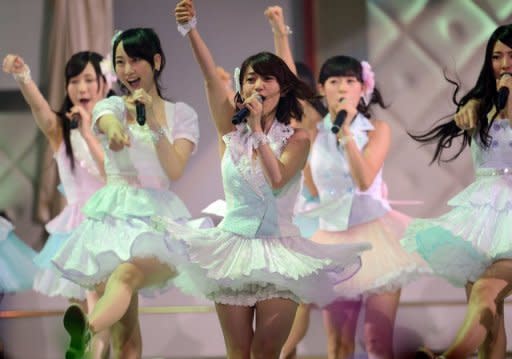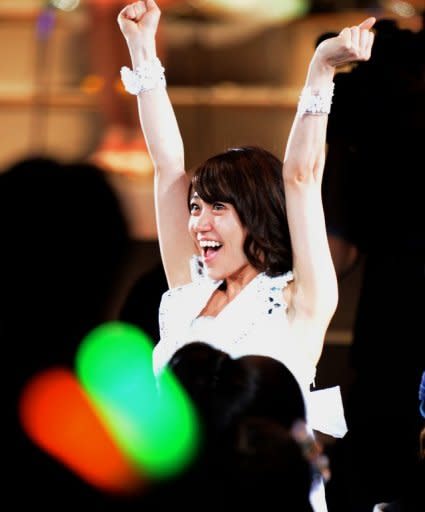Japan pop fans go crazy for democracy
The election debate that raged across Japan for weeks has been settled, campaigners are packing up their things and TV pundits are moving on to different topics -- all-girl group AKB48 has a new president. Pictures of teary-eyed 23-year-old Yuko Oshima dominated Thursday's newspapers after her victory in a popular ballot for the top spot in one of the world's highest grossing acts. Hundreds of hours of television coverage culminated in a live special with millions tuning in nationwide to see Oshima crowned. "You, my dear fans, have given water and light," a teary-eyed Oshima told supporters, comparing herself with a flower bud. "A flower will wither someday. Please be my sunshine forever." Anyone was allowed to vote in the election -- as long as they bought a copy of AKB48's most recent single "Manatsu no Sounds Good!" (a mixture of Japanese and English that defies sensible translation, but has something to do with summer). The single and accompanying ballot paper, which had a list price of 1,600 yen ($20), shifted a record-breaking 1.17 million units the day it went on sale, with some fans reportedly buying multiple copies to boost the chances of their favourite candidate. Oshima will now stand centre stage and take a lead role in the wildly-popular group's future musical offerings and performances. With a 90-strong pool of girls in their teens and early 20s who are rotated in and out of the public eye based on their popularity, AKB48 is part pop act, part talent show. Much of the group's appeal lies in their being accessible idols, with frequent opportunities for fans to meet them, chat with them or befriend them on social networking sites. This strategy, combined with the baring of much flesh, has given them a huge following, particularly among Japan's salarymen. "I am really happy about the result," said Makoto Yoshida, a 35-year-old fan. "I don't think anyone but Yuko Oshima can lead AKB48. I love Yuko because she works hard and always does things to the best of her ability. That's something I should learn from her. "I love her smile, too," he added shyly. Wednesday's election was sparked by the forthcoming "graduation" from AKB48 of 20-year-old Atsuko Maeda, who led the collective twice -- her reign was interrupted by Oshima for a year. Maeda's tearful abdication earlier this year clears the way for her to pursue solo projects, possibly still under the careful guidance of Yasushi Akimoto, the mastermind behind the group and decider of who performs on stage. Music critic and commentator on Japan's entertainment industry Satoshi Hamano, said the notion of an election -- while seemingly little more than a slick marketing trick -- was borne of demands from fans. "Some fans complained and demanded they should be allowed to select who should be their idols," he said. "It was a democratic movement against dictator Akimoto. It may sound wild, but the movement is comparable to the Arab Spring," he told AFP. Hyperbole notwithstanding, the group's popularity is staggering, as is the merchandising industry it supports, encompassing everything from t-shirts to card games. They are also advertising gold and have been involved in promotions for products as diverse as sweets and government bonds, while fronting a campaign aimed at reducing teenage suicide. A commercial showing group members passing bite-sized candies seductively from mouth-to-mouth attracted a limited amount of criticism for "encouraging homosexuality", but did no harm either to AKB48 or the confectionery company that commissioned it and became an Internet hit. The pitfalls of fame have largely been avoided for the group; an incident in which the mother of one leading member was alleged to have had sexual relations with a teenage boy failed to dent the girl's popularity and received scant coverage in Japan's tame mainstream media. And complaints about the over sexualisation of the young women -- many of whom are still teenagers -- are brushed aside, or even played on; the cover of the latest single is a flesh-fest of bikini-clad girls. Critic Hamano said Wednesday's election served as a proxy for democratic empowerment in a country largely run by older men. "Japanese youth do not believe they can change real politics, where old politicians hold a tight grip on power, but they believe they can change AKB48," he said. "Fans of AKB48 believe they can take part in the process of making a real star, rather than simply accepting what the industry says is good. "This is the Japanese version of the American dream."



